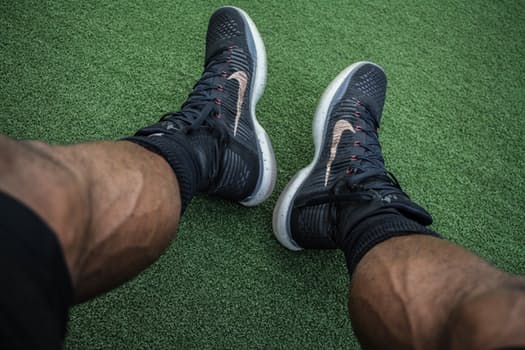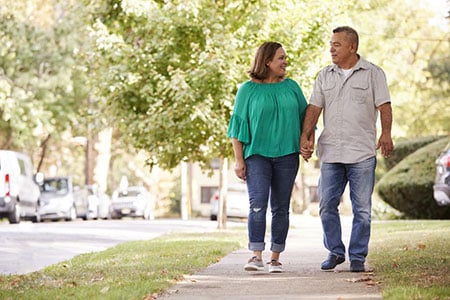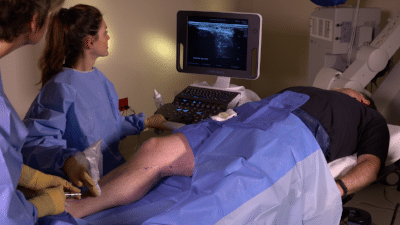Could Low Testosterone Increase the Risk of Varicose Veins in Men?

It’s a common misconception only women suffer from varicose veins, however, it is estimated that somewhere between 15% and 45% of men will develop varicose veins or venous insufficiency at some point in their lives. The exact number is unknown, primarily because a significant number of men do not seek treatment for vein disorders.
There are several factors that contribute to varicose vein formation; genetics, age, diet, exercise, stress, and weight are all important to vein health. But gender is also considered a risk factor and there are some indications that our “sex hormones” may be the culprit - particularly estrogen.
Estrogen in Men? Definitely!
While women synthesize most of their estrogen in their ovaries and other reproductive tissues, men produce estrogen through a process involving an enzyme called aromatase. Aromatase is found in many tissues including gonads, brain, adipose tissue, blood vessels, skin, and bone. Aging men sometimes have too much aromatase activity, which causes their testosterone to convert to excess estradiol, the predominant form of estrogen.
Estradiol is a known contributor to varicose vein development in pregnant women; it shrinks and impairs the function of venous valve flaps, breaks down the integrity of venous walls, and causes blood vessels to dilate, or get wider. So what does estrogen have to do with varicose veins in men? It could be a lot!
While it is too small to be clinically significant, a study published by researchers at the Universitat Leipzig in Germany noted that all of the men in their study with varicose veins had higher levels of estradiol and lower levels of testosterone (low T) compared to the men with healthy veins. What this shows is that estradiol alone is not the culprit, rather the ratio of estradiol to testosterone appears to be the determining factor.
As men age, testosterone levels naturally decline. Where a younger man’s testosterone to estrogen levels might naturally be 50:1, an older man might experience a ratio of 8:1. What the science seems to suggest is that when the ratio of estrogen to testosterone is out of whack, men are at higher risk for developing vein disorders.
Concerned About Your Vein Health?Click Here to Download a Self Assessment |
Restoring Hormone Balance is Good for Vein Health
The hormonal system helps to govern all aspects of the bodies’ functions. Its interconnectedness is complex; its balance is somewhat delicate and can be easily thrown off track. We are bombarded by stories about potential hormone disrupters and estrogen mimickers that some fear, are messing up these complex systems. Regardless of whether this is true, there are many lifestyle choices that men can make to help maintain—or restore—hormonal balance and improve their vein health.
- Maintain a healthy weight. Obesity is a significant risk factor, both for overproduction of estrogens and for varicose vein formation. Not only do the extra pounds increase strain on the vascular system, but also fat cells are particularly rich in the enzyme aromatase. The more aromatase in the system, the more testosterone will be converted to estradiol.
- Manage your stress levels. Cortisol, the hormone associated with the “fight or flight” response, increases when stress levels are high. High cortisol levels inhibit testosterone production.
- Get good quality sleep. Most testosterone is produced when we sleep. Actually, a lot of important things happen only when we are sleeping. Plus, sleep is just awesome.
- Nourish your body. It is important to eat a wide variety of whole foods in order to get the building blocks required for good hormone production and balance.
- Exercise the right amount. Moderation in all things. Studies have found that men who exercise a LOT have lower testosterone levels than their counterparts who exercise a moderate amount.
Men who develop varicose veins should consult with a qualified vein specialist to determine whether their vascular system is compromised, and what can be done to improve venous blood flow back to the heart.
Tempe-based vein specialist, Jilanne Rose of Advanced Vein Institute of Arizona, has noticed that men tend to wait until their veins get painful—or worse—before seeking treatment. Because of this tendency, she encourages everyone to look out for the vascular health of the men—and the women—in their lives.
And these days, Jilanne adds, it is easier than ever to improve vascular health. Vein treatments are less invasive, less painful, less expensive and more successful than they have ever been. Simply make an appointment with a qualified vein specialist who can precisely determine the health of your lower extremity veins, and help you make informed decisions about what treatment (if any) is right for you.
Question: I am 50 years old; a bachelor, and a teacher. Right now I have varicose veins (though they are not painful) in my right leg. I am not happy to see them. What can you suggest to lessen its visibility? Answer: Unfortunately, most conservative therapies are designed for symptomatic control and not necessarily appearance. Treatments…
Read MorePregunta: me lastimé el pie ayer a medio camino hacia los dedos de los pies. Tengo que volar en dos días. ¿Debo usar calcetines de vuelo? Mi pie está ligeramente hinchado. He estado descansando con el pie hacia arriba. Puedo caminar sobre ella. Duele un poco. El vuelo dura 7 horas.
Read MorePregunta: tengo trombosis venosa profunda (TVP) en mi pantorrilla derecha, sólo han pasado 3 semanas desde que me enteré. Mi pierna todavía se hincha después de 3 semanas, incluso cuando llevo mi media de compresión 20 -30. Es normal. ¿Debo quitarlo y elevar mi pierna o dejarla encendida?
Read MoreQuestion: I hurt my foot yesterday halfway towards the toes. I have to fly in 2 days. Should I wear flight socks? My foot is slightly swollen. I've been resting with the foot up. I can walk on it. It hurts a little bit. The flight is 7 hours long.
Read MoreQuestion: I have deep vein thrombosis (DVT) in my right calf, it has only been 3 weeks since I found out. My leg still swells after 3 weeks even when I wear my compression stocking 20 -30. Is this normal. Should I be take it off and elevate my leg or leave it on?
Read MorePregunta: Quiero saber que ejercicios funcionan mejor ya que mi tratamiento EVLT no me dio los buenos resultados que me esperaba.
Read MoreQuestion: I want to know which exercises work best since my EVLT treatment did not get me the good results that I expected. Answer: Ones ability to exercise, and the types of exercise a person can complete, varies greatly. Speaking in generalities, exercise that benefits lower extremity venous health does not have to be significantly…
Read MoreLa cirugía de la vena varicosa no es lo que solía ser Si usted ha escuchado — o experimentado — historias sobre la cirugía de eliminación de venas estándar que ocurrieron antes de la vuelta de este siglo, es comprensible si usted está preocupado acerca de la búsqueda de ayuda de un especialista en venas…
Read MoreVaricose vein surgery not what it used to be If you have heard-or experienced–stories about standard vein removal surgery that happened prior to the turn of this century, it is understandable if you are concerned about seeking help from a qualified vein specialist for your painful varicose veins. There was a time when leg vein…
Read MoreCalambres en las piernas Hay muchas razones para los calambres musculares. Mucha gente los experimenta debido a una deficiencia de ciertos elementos clave como el potasio y el magnesio. Otros, particularmente aquellos que viven en climas más cálidos como Arizona, experimentan calambres debido a la deshidratación. UN gran número de pacientes a los que consulto,…
Read More

